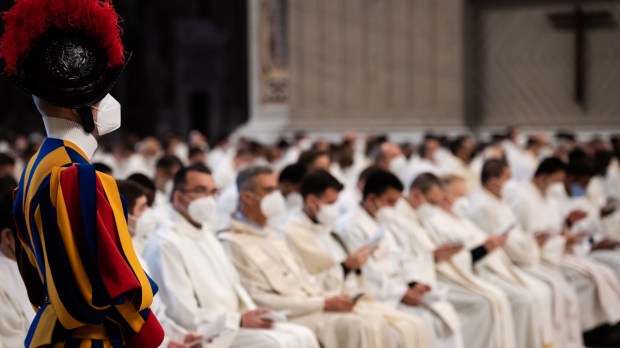Friday 15 April 2022
1- What is in the book by the Bishop of Ajaccio (France) that the Pope offered to the priests at the Chrism Mass?
2- Countries leaning toward or against Russia and how Pope Francis can influence them
3- The war has helped to resurrect the Church in Poland
4- Jerusalem’s Christian churches resist Israeli settlers
5- Manila Cardinal washes the feet of election officials in light of upcoming vote
~
Vatican News reports on the book by Bishop François-Xavier Bustillo of Ajaccio (France), which Pope Francis gave to the priests present at the Chrism Mass on April 14. It is a book that offers priests ideas for their mission by quoting Kierkegaard, Camus, Nelson Mandela and Martin Luther King, and warning against the worst temptations. The author delivers not a “good priest’s manual” but a long pastoral letter that refers to “us.” Two syndromes to avoid in the priesthood, according to Archbishop Bustillo: that of the “besieged citadel” and that of Calimero who thinks that everything “is unjust.” The Archbishop insists on the importance of the laity in accompanying the lives of priests, “to avoid a sad and neurotic life.” He says analyzing things through strict criteria, like “likes” or “dislikes” on Facebook, is “a bit short for the wisdom of the Church.” And, as the Pope often does, Bishop Bustillo reminds us that the priest is not a civil servant who gives appointments at “fixed times.”
Vatican News, Italian.
Countries leaning toward or against Russia and how Pope Francis can influence them
Vatican scholar John Allen provides an overview of global geopolitics that shows how little leverage Pope Francis has in the context of the Russian offensive in Ukraine. The Pope’s weak leverage vis-à-vis governments located in Russia’s orbit could concern three predominantly Catholic countries in Latin America (Venezuela, Nicaragua, Cuba) and above all three African countries in which he has made trips advocating peace and reconciliation: Central African Republic, Mozambique and Madagascar. However, the balance of power is not favorable on the world scene. Indeed, if the majority of the world’s countries are on the side of Ukraine, the attitude of China and the ambiguity of India towards Russia show that an important part of the world’s population could be in the pro-Russian bloc. The communist regime in China and the Hindu nationalist government in power in New Delhi do not seem inclined to heed Pope Francis’ calls. “Of course, no pope possesses a magic wand that can make all the world’s problems disappear. In the current conflict, however, the Pope’s options seem even more limited than normal – which, for the famously stubborn Francis, may only serve to make him all the more determined to try,” concludes Allen.
Crux, English
The war has helped to resurrect the Church in Poland
After a period of decline and weakness, the Polish Church has come back to life with its outpouring of charity towards Ukrainian refugees, argues journalist Luke Coppen in an opinion article published in the English daily The Spectator. He analyzes that, following Pope John Paul II’s death in 2005, the Polish Church “began to lose its way.” The abuse crisis and the punishment of several bishops, the Church’s “perceived alliance” with the ruling and “polarising Law and Justice party,” and the tightening of the country’s abortion laws, are only some of the issues Coppen says contributed to divisions and disappointments within the Church of Poland. However, since the beginning of the war in Ukraine, Coppen says, “Polish Catholics have come to embody one of Pope Francis’ most powerful intuitions: that the renewal of the Church comes through service.” Although the journalist acknowledges this isn’t enough to reverse the decline in Church participants, this situation can still be conceived as “an internal reinvigoration.”
The Spectator, English.
Jerusalem’s Christian churches resist Israeli settlers
“We have a major problem here (…) Jerusalem also has her Christian character, and that is what is threatened,” declared the Greek Orthodox Patriarch Theophilus III to AFP on April 14. The holy city of Jerusalem is divided into four historical quarters: Jewish, Muslim, Christian and Armenian. The patriarch accused extremist Jewish settlers, known for their desire to seize the properties of Palestinian families, of leading campaigns for the control of land belonging to Christians. Since 2005, a group of Jewish “nationalist settlers” and the Orthodox Church have been engaged in a complex legal dispute over the ownership of a hostel in the Old City, at the entrance to the Christian Quarter. On March 27, the settlers broke into and occupied part of the hostel. According to Theophilus III, although the Israeli government promised that it would put “pressure on those radical groups to get out,” nothing has changed in the last two weeks. “If they succeed, this is changing the whole character of the Old City,” said Hagit Ofran, from the Israeli anti-settler group Peace Now — especially since this building is strategically placed at the entrance to the Christian quarter.
France24, English.
Manila Cardinal washes the feet of election officials in light of upcoming vote
Archbishop of Manila, Cardinal José Advincula, chose 12 people for the ritual of washing of the feet on Holy Thursday which are all symbolically connected to the upcoming presidential elections in the Philippines. The people include three young first-time voters, two members of the Electoral Board, three officials of the Commission on Elections (Comelec), three members of the Parish Pastoral Council for Responsible Voting, and a journalist. AsiaNews explains that the decision to include a journalist is particularly significant “in a country where some of the dominant issues in the campaign are the attempts to whitewash the dictatorial rule” of ex-President Ferdinand Marcos and whose son, Ferdinand Marcos Jr., is currently leading the polls.
AsiaNews, English.

